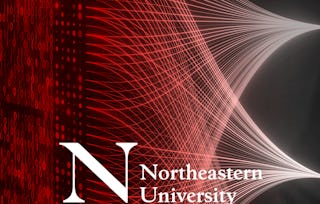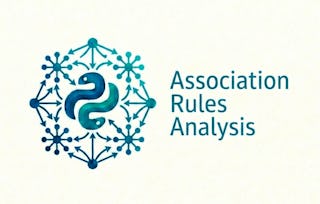Learn the general concepts of data mining along with basic methodologies and applications. Then dive into one subfield in data mining: pattern discovery. Learn in-depth concepts, methods, and applications of pattern discovery in data mining. We will also introduce methods for data-driven phrase mining and some interesting applications of pattern discovery. This course provides you the opportunity to learn skills and content to practice and engage in scalable pattern discovery methods on massive transactional data, discuss pattern evaluation measures, and study methods for mining diverse kinds of patterns, sequential patterns, and sub-graph patterns.

Pattern Discovery in Data Mining

Pattern Discovery in Data Mining
This course is part of Data Mining Specialization

Instructor: Jiawei Han
44,477 already enrolled
Included with
326 reviews
Skills you'll gain
Details to know

Add to your LinkedIn profile
9 assignments
See how employees at top companies are mastering in-demand skills

Build your subject-matter expertise
- Learn new concepts from industry experts
- Gain a foundational understanding of a subject or tool
- Develop job-relevant skills with hands-on projects
- Earn a shareable career certificate

There are 5 modules in this course
The course orientation will get you familiar with the course, your instructor, your classmates, and our learning environment.
What's included
1 video3 readings1 assignment1 discussion prompt1 plugin
Module 1 consists of two lessons. Lesson 1 covers the general concepts of pattern discovery. This includes the basic concepts of frequent patterns, closed patterns, max-patterns, and association rules. Lesson 2 covers three major approaches for mining frequent patterns. We will learn the downward closure (or Apriori) property of frequent patterns and three major categories of methods for mining frequent patterns: the Apriori algorithm, the method that explores vertical data format, and the pattern-growth approach. We will also discuss how to directly mine the set of closed patterns.
What's included
9 videos2 readings2 assignments1 programming assignment
Module 2 covers two lessons: Lessons 3 and 4. In Lesson 3, we discuss pattern evaluation and learn what kind of interesting measures should be used in pattern analysis. We show that the support-confidence framework is inadequate for pattern evaluation, and even the popularly used lift and chi-square measures may not be good under certain situations. We introduce the concept of null-invariance and introduce a new null-invariant measure for pattern evaluation. In Lesson 4, we examine the issues on mining a diverse spectrum of patterns. We learn the concepts of and mining methods for multiple-level associations, multi-dimensional associations, quantitative associations, negative correlations, compressed patterns, and redundancy-aware patterns.
What's included
9 videos2 readings2 assignments
Module 3 consists of two lessons: Lessons 5 and 6. In Lesson 5, we discuss mining sequential patterns. We will learn several popular and efficient sequential pattern mining methods, including an Apriori-based sequential pattern mining method, GSP; a vertical data format-based sequential pattern method, SPADE; and a pattern-growth-based sequential pattern mining method, PrefixSpan. We will also learn how to directly mine closed sequential patterns. In Lesson 6, we will study concepts and methods for mining spatiotemporal and trajectory patterns as one kind of pattern mining applications. We will introduce a few popular kinds of patterns and their mining methods, including mining spatial associations, mining spatial colocation patterns, mining and aggregating patterns over multiple trajectories, mining semantics-rich movement patterns, and mining periodic movement patterns.
What's included
10 videos2 readings2 assignments
Module 4 consists of two lessons: Lessons 7 and 8. In Lesson 7, we study mining quality phrases from text data as the second kind of pattern mining application. We will mainly introduce two newer methods for phrase mining: ToPMine and SegPhrase, and show frequent pattern mining may be an important role for mining quality phrases in massive text data. In Lesson 8, we will learn several advanced topics on pattern discovery, including mining frequent patterns in data streams, pattern discovery for software bug mining, pattern discovery for image analysis, and pattern discovery and society: privacy-preserving pattern mining. Finally, we look forward to the future of pattern mining research and application exploration.
What's included
9 videos2 readings2 assignments1 programming assignment1 plugin
Earn a career certificate
Add this credential to your LinkedIn profile, resume, or CV. Share it on social media and in your performance review.
Prepare for a degree
Taking this course by University of Illinois Urbana-Champaign may provide you with a preview of the topics, materials and instructors in a related degree program which can help you decide if the topic or university is right for you.
Instructor

Offered by
Explore more from Data Analysis
 Status: Free Trial
Status: Free TrialUniversity of Illinois Urbana-Champaign
 Status: Free Trial
Status: Free TrialUniversity of Colorado Boulder
 Status: Preview
Status: PreviewNortheastern University
 Status: Free Trial
Status: Free TrialUniversity of Colorado Boulder
Why people choose Coursera for their career

Felipe M.

Jennifer J.

Larry W.

Chaitanya A.
Learner reviews
- 5 stars
56.74%
- 4 stars
23.92%
- 3 stars
11.96%
- 2 stars
3.98%
- 1 star
3.37%
Showing 3 of 326
Reviewed on Apr 23, 2017
Should be more support in the forum for quiz and assignement
Reviewed on Mar 4, 2017
The course exercises are medium-hard. But the topic coverage is spot on.
Reviewed on Dec 11, 2017
It is a good course but more knowledge are expected to be filled, e.g, some algorithm can be detailed or illustrated with simple-case instantiation.

Open new doors with Coursera Plus
Unlimited access to 10,000+ world-class courses, hands-on projects, and job-ready certificate programs - all included in your subscription
Advance your career with an online degree
Earn a degree from world-class universities - 100% online
Join over 3,400 global companies that choose Coursera for Business
Upskill your employees to excel in the digital economy
Frequently asked questions
To access the course materials, assignments and to earn a Certificate, you will need to purchase the Certificate experience when you enroll in a course. You can try a Free Trial instead, or apply for Financial Aid. The course may offer 'Full Course, No Certificate' instead. This option lets you see all course materials, submit required assessments, and get a final grade. This also means that you will not be able to purchase a Certificate experience.
When you enroll in the course, you get access to all of the courses in the Specialization, and you earn a certificate when you complete the work. Your electronic Certificate will be added to your Accomplishments page - from there, you can print your Certificate or add it to your LinkedIn profile.
Yes. In select learning programs, you can apply for financial aid or a scholarship if you can’t afford the enrollment fee. If fin aid or scholarship is available for your learning program selection, you’ll find a link to apply on the description page.
More questions
Financial aid available,

